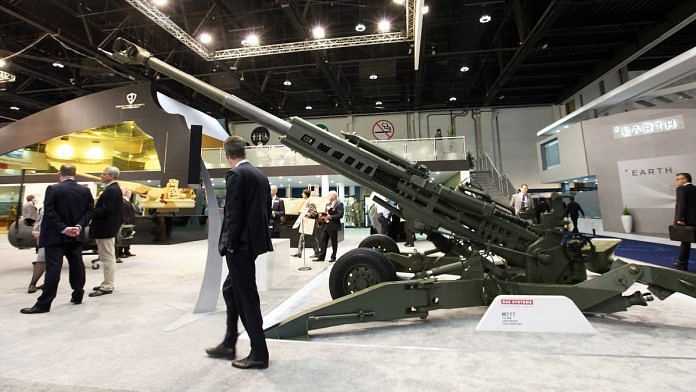New Delhi: Chief of Defence Staff Gen. Bipin Rawat will soon initiate identification of weapons and platforms for an import ban as the Narendra Modi government Saturday announced a slew of measures to boost the ‘Make in India’ programme in the defence sector.
While raising the foreign direct investment (FDI) limit in defence manufacturing to 74 per cent from the current 49 per cent as part of the fourth tranche of the economic stimulus package, Finance Minister Nirmala Sitharaman said the government will notify a list of weapons and platforms for ban on import with year-wise timelines.
This is a first for the sector in India.
The FM also stressed that there would be indigenisation of imported spares and separate provisioning for domestic capital procurement.
The indigenisation of spare parts has been in the works for long. It was kickstarted by former defence minister Manohar Parrikar.
Calling these “structural reforms”, Sitharaman said these steps will reduce the huge defence import bill.
Last year, India ranked as the second biggest importer of defence equipment in the world. India was the top importer for over a decade but last year’s ranking did not take into account the slew of multi-billion-dollar deals — S-400 Triumf air defence system, lease of a nuclear submarine, manufacturing of frigates and AK 203 — signed between India and Russia in the last three years, deliveries of which are yet to start.
Sitharaman also said the Ordnance Factory Board (OFB) would be corporatised, but underlined that this was not privatisation. The OBF runs 41 factories across the country and its corporatisation has been under public discussion for some time.
The hike in FDI limit in defence manufacturing will come as a huge relief for foreign companies who have been consistently asking the Ministry of Defence (MoD) to give them the controlling stake in a joint venture.
The FM also announced a time-bound defence procurement process besides setting up of a Project Management Unit (PMU) to support contract management. She stressed setting up realistic demands for weapons and platforms that are intended to be purchased.
She also said the government has decided to overhaul trial and testing procedures.
Also read: Government opens space sector, ISRO facilities for private players
Banned items could include artillery, specialised ammunition
Senior defence sources told ThePrint that what Finance Minister Nirmala Sitharaman has announced is a policy direction.
“She has not announced an implementation process. The identification of the items that will be banned from import will commence,” said a source on condition of anonymity.
Asked about possible items that could be banned from imports, sources said this include items like artillery that are already being manufactured in the country.
“India is right now producing different kinds of artillery guns. Specialised guns that were not available domestically, like the M777 lightweight howitzers, have been imported as per the required numbers. Why should we as a country import artillery guns when they are already available?” said the source.
The focus is to ensure that foreign companies should manufacture the product for India in India only, said the source.
“We have been stressing on Transfer of Technology and Make in India. The increase in automatic FDI from 49 per cent to 74 per cent will give more room to the Original Equipment Manufacturer,” the source said.
The banned items could also include specialised ammunition which is already being manufactured in India. Sources said the plan is to expand the production base to private players from OFBs and others to ensure that more items under better quality control are manufactured in the country.
Sources added that the year-wise timelines for a ban would be given because while equipment are being attempted to be manufactured in India, they have not reached the levels for procurement. This would give both domestic and foreign companies time to plan tie-ups and production accordingly.
Also read: Navy will provide crucial intelligence to northern, western border theatre commands: Rawat




Both scenarios of India’s overwhelming purchase of latest weaponry as well as indigenization of Defence equipment have repercussions on South Asian stability. At the moment, the India and Pakistan have virtually frozen their bilateral relationship where confidence building measures have taken a back seat. India, under Modi government, has followed policy of coercion particularly against Pakistan which shares territorial conflict with former. The influx of latest weapons in India, during such a volatile environment will further add to Pakistan’s security concerns.
Fake nationalism of the Hindutva variety is not limited to only the national movement, where the RSS was conspicuous by its absence. It is also manifested in Modi’s Make in India, which is an offer to global capital to exploit India’s cheap labour, along with various tax breaks and subsidised land. Developing its people is the key to the future development of a country. Something a Make in India program will not do. That is why Make in India is a pale reflection of the earlier Made in India vision. That is why any nationalism that defines itself through land and not its people, belongs to the past.
The unchecked weapons flow to the Hindutva hardliners controlled India, from the western capitals, is insane. Therefore, it is the collective responsibility of the International community to shun Indian aggressive policies which have left Indian Muslims with fears of statelessness and also millions of Kashmiris caged. It is the right time to make Indian leadership realize that it’s not the pursuit of hard power that is a remedy for the disputes but diplomacy and consistent efforts for peace through dialogue is the only civilized way.
The abruptness of this decision has lot to reveal. Only because industries from China are being shifted to Vietnam despite all the warmth and hospitality extended to Trump, this decision has been taken. But do we have that RD base ? And why RD has failed in our country despite all calibre and knowledge?